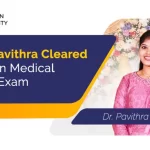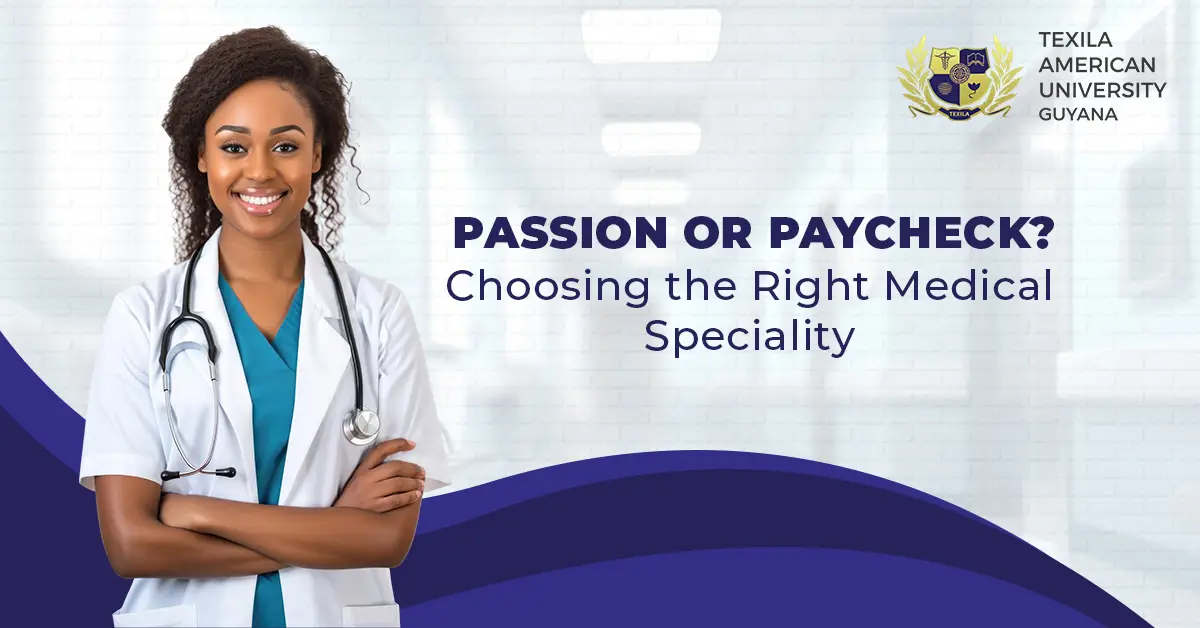Blog Summary
Caribbean medical schools are increasingly popular among aspiring physicians, but accreditation is a pivotal consideration for students. Accreditation ensures rigorous standards in medical education, validating program credibility and facilitating licensure and residency placement. Accredited schools undergo thorough evaluations covering curriculum, faculty, facilities, and student outcomes. For students, accreditation ensures quality education, licensure exam eligibility, enhanced residency competitiveness, and access to financial aid. Caribbean medical schools attain programmatic accreditation from bodies like CAAM-HP or ACCM, showcasing compliance with industry standards. Verifying accreditation involves researching accrediting bodies and contacting admissions offices. When selecting a Caribbean medical school, students should prioritize accreditation status and consider reputation, curriculum, clinical training, and support services. Ultimately, accreditation signifies quality and lays the foundation for a successful medical career.
Introduction
Caribbean medical schools have gained popularity among aspiring physicians seeking alternative pathways to pursue their dreams of practising medicine. However, accreditation is a critical aspect that students must consider when choosing a Caribbean medical school. Accreditation ensures that medical education meets rigorous standards and prepares students for licensure and residency training. In this comprehensive guide, we’ll delve deeper into what accreditation entails for students attending Caribbean medical schools and why it’s a crucial factor to consider in their academic journey. We will also provide an in-depth exploration of various related aspects.
What is Accreditation?
Accreditation is a rigorous process through which educational institutions undergo evaluation by accrediting bodies to ensure they meet predetermined standards of quality and excellence. For medical schools, accreditation validates the credibility and legitimacy of their educational programs, faculty qualifications, facilities, and student outcomes. Accredited medical schools are recognized by regulatory bodies, medical licensing boards, and residency programs, facilitating student eligibility for licensure examinations and residency training.
Accreditation involves comprehensive assessments of various aspects of a medical school, including its curriculum, faculty expertise, student support services, facilities, and clinical training opportunities. Accrediting bodies establish and maintain these standards to ensure that medical education meets the evolving needs of the healthcare industry and consistently produces competent and compassionate physicians.

Importance of Accreditation for Students
- Quality Assurance: Accreditation ensures that students receive a high-quality medical education that meets established standards of excellence, preparing them for successful medical careers. Rigorous evaluation processes help identify areas for improvement and ensure continuous enhancement of educational programs to meet the evolving demands of the healthcare landscape.
- Licensure Eligibility: Graduating from an accredited medical school is a prerequisite for eligibility to sit for licensure examinations, such as the United States Medical Licensing Examination (USMLE) or the Caribbean Association of Medical Councils (CAMC) Examination. Accreditation validates the adequacy of medical training and ensures that graduates possess the knowledge and skills necessary to practice medicine safely and effectively.
- Residency Placement: Accreditation enhances students’ competitiveness for residency positions, as residency programs typically prefer candidates from accredited medical schools due to their demonstrated adherence to educational standards and clinical training requirements. Accredited medical schools provide robust clinical experiences and foster professional development, preparing graduates for successful transitions into residency programs and future medical practice.
- Financial Aid and Federal Loans: Attending an accredited medical school may be a requirement for eligibility for federal financial aid programs, scholarships, and student loans. Accreditation assures funding agencies and stakeholders that students invest in reputable educational institutions that meet established quality standards, facilitating access to financial resources for tuition and living expenses.
Accreditation for Caribbean Medical Schools
- Programmatic Accreditation: Programmatic accreditation is specific to medical education and is granted by accrediting bodies such as the Caribbean Accreditation Authority for Education in Medicine and Other Health Professions (CAAM-HP) or the Accreditation Commission on Colleges of Medicine (ACCM). Programmatic accreditation ensures that medical schools meet established standards for curriculum, faculty qualifications, clinical training, and student outcomes.
- Recognition and Compliance: Caribbean medical schools must undergo rigorous evaluations to obtain and maintain accreditation from recognized accrediting bodies. Compliance with accreditation standards demonstrates the institution’s commitment to academic excellence, continuous improvement, and adherence to best practices in medical education.
How to Verify Accreditation
- Research Accrediting Bodies: Familiarize yourself with the accrediting bodies responsible for evaluating Caribbean medical schools and verify the accreditation status of your prospective institution. Conduct thorough research to understand the accreditation process, standards, and criteria used for evaluation.
- Visit Accrediting Bodies’ Websites: Accrediting bodies typically maintain official websites where you can access information about accredited institutions, accreditation standards, and the accreditation process. Utilize these resources to verify the accreditation status of Caribbean medical schools and gather relevant information to inform your decision-making process.
- Contact Admissions Offices: Contact the admissions offices of Caribbean medical schools to inquire about their accreditation status, history, and any recent accreditation updates or changes. Admissions representatives can provide valuable insights and guidance regarding accreditation-related inquiries and help you make informed decisions about your educational journey.

Considerations When Choosing a Caribbean Medical School
- Accreditation Status: Prioritize attending a Caribbean medical school accredited by recognized accrediting bodies. Accreditation ensures quality assurance, licensure eligibility, and residency placement opportunities. Verify the institution’s accreditation status and assess its compliance with accreditation standards and requirements.
- Reputation and Track Record: Research the reputation and track record of Caribbean medical schools, considering factors such as academic excellence, student outcomes, residency placement rates, and alums success stories. Seek feedback from current students, alums, and healthcare professionals to gain insights into the institution’s educational quality and overall reputation.
- Curriculum and Clinical Training: Evaluate the curriculum structure, clinical training opportunities, faculty qualifications, and educational resources offered by each medical school to ensure alignment with your academic and career goals. Consider integrating clinical experiences, research opportunities, and specialty rotations to enhance your learning experience and professional development.
- Support Services and Resources: Consider the availability of support services, such as academic advising, career counselling, student wellness programs, and financial aid assistance, to enhance your educational experience and overall well-being. Access to comprehensive support services can contribute to your success as a medical student and facilitate your transition into residency training and future medical practice.
Conclusion
Accreditation is pivotal in shaping students’ educational experiences and career prospects at Caribbean medical schools. By choosing an accredited institution, students can ensure they receive a high-quality medical education that meets established standards of excellence and prepares them for licensure, residency training, and successful careers in medicine. When exploring options for Caribbean medical education, students should prioritize accreditation status, research accrediting bodies, and consider factors such as reputation, curriculum, clinical training, and support services to make informed decisions about their academic journey. Remember, accreditation is a hallmark of quality and a foundation for your future success in the medical profession.
Peoples Also Know
Why is accreditation important for Caribbean medical schools?
Accreditation is crucial for Caribbean medical schools as it ensures that the education meets rigorous standards set by accrediting bodies. It validates the program’s credibility, enhances students’ eligibility for licensure exams, and improves their competitiveness for residency placements.
How can students verify the accreditation status of Caribbean medical schools?
Students can verify accreditation status by researching accrediting bodies such as CAAM-HP or ACCM, visiting their official websites, and contacting admissions offices directly. These steps help ensure that the chosen institution meets recognized quality standards in medical education.
What is the significance of programmatic accreditation for Caribbean medical schools?
Programmatic accreditation, granted by bodies like CAAM-HP or ACCM, ensures that medical schools meet specific standards related to curriculum, faculty qualifications, clinical training, and student outcomes. It serves as a quality assurance measure and showcases compliance with industry standards.
Can attending an accredited Caribbean medical school affect financial aid eligibility?
Attending an accredited medical school may be a requirement for eligibility for federal financial aid programs, scholarships, and student loans. Accreditation assures funding agencies that students invest in reputable educational institutions, facilitating access to economic resources for tuition and living expenses.
How does accreditation benefit students beyond graduation?
Accreditation benefits students beyond graduation by enhancing their competitiveness in the job market and ensuring their preparedness for medical practice. Graduating from an accredited medical school increases opportunities for licensure, residency placement, and ongoing professional development, laying a solid foundation for a successful career in medicine.












